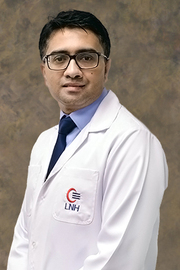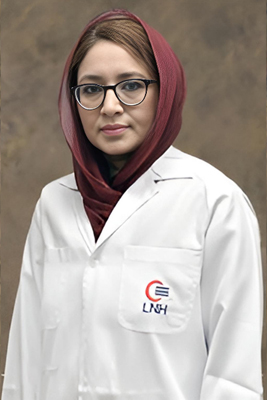Infectious disease is a field of medicine which deals with diseases caused by microorganisms. These infections may spread from exposure to infected person, animal or contaminated surface that harbors a pathogen capable of infecting humans.
Depending on site of infection in the body, infections are classified primarily as respiratory infections, gastrointestinal infections, genitourinary infections, nervous system infections, skin and soft tissue infections, bone and joint infections, cardiovascular infections, and generalized (disseminated) infections.
Many Infectious diseases may contribute to other medical issues. Our experts work in close coordination with other specialists in the hospital to make sure that the patient gets the care that they need, depending on their situation.
Since LNH is a tertiary care hospital, the patient gets all the services and experts of all disciplines in one place. Highly specialized doctors work together and develop caretaking strategies among the multi-disciplinary team which gives the patient and caregivers a satisfaction of being taken care in a broader spectrum.
Services
Specialized services provided by this specialty include:
Investigations, diagnosis and treatment of different types of infections caused by bacteria, virus, parasites or fungus such as:
-
Respiratory tract infections
- Sore throat
- Pharyngitis
- Tonsillitis
- Coryza
- Diphtheria
- Pneumonia
- Lung Infection
- Viral Bronchitis
-
Tuberculosis
- Lung infection
- Meningitis (Brain infection)
-
Heart Infections
- Infective Endocarditis
- Myocarditis
- Pericarditis etc.
-
STI (Sexually transmitted infections)
- Gonococcal infection etc.
-
Central nervous system infections
- Abscess
- Bacterial Meningitis
- Encephalitis etc
-
Joint infections
- Septic Arthritis
-
Skin and Soft Tissues infections
- Foot infections as diabetic foot
- Cellulitis
- Erysipelas
- Bone infections (Osteomyelitis)
- HIV (AIDS) with Opportunistic infections
- Typhoid (Salmonella Typhi infection)
- Malaria
- Dengue
- COVID-19 infection
- Hepatitis B and C
- Monkeypox (Mpox)
- Chickenpox
- Surgical site and wound infections
-
Skin Infections
- Bacterial infection – Staph Infection
- Fungal infection (e.g Ring worm)
- Viral infection - Herpes Zoster Infection
-
Other possible kinds of infection
- Acute infections and chronic infections
- Bacterial Infections: Streptococcus, MRSA, Enterococcus, Salmonella, E. coli, Klebsiella etc.
- Fungal Infections: Candidiasis/ Aspergillosis/ Mucormycosis
- Viral Infections: Infectious Mononucleosis etc.
- Parasitic Infections
- Different types of Blood infections: MRSA, Resistant Gram negative bacteria, Candida Blood Stream Infections
- Urinary tract Infections / Gastrointestinal Infections: All intestinal infections including Oral cavity (mouth), esophagus, colon, ileum, duodenum, and stomach etc. / liver infections)
- Hospital and health care associated infections: Nosocomial Infections / Contagious and non-contagious infections
- The infectious diseases service makes an important contribution to formulary decision making, antimicrobial restriction policies, and the establishment and operation of antimicrobial approval systems.
- Infectious disease also provides services in Infection Control and prevention program in Hospital that works in conjunction with Quality Assurance to limit/eliminate risk of patient as well as, caregiver, visitor and staff exposure. It also defines policies for hospital acquired infections, drug resistant microbes surveillance, waste management, needle stick injuries, standard and transmission based precautions etc.
Frequently Asked Questions
Infectious disease doctors can interpret tests that identify the cause of an infectious illness more precisely. The conditions can include unexplained fever or wound, vast variety of infections, anticipated international travel, and chronic illness such as HIV, Hepatitis B, or Hepatitis C. Infectious disease doctors have the expertise to treat people with an antibiotic-resistant infection — an increasingly common issue that can complicate recovery.
Infectious disease doctor design treatments based on type and severity of infections. Medications including Antibiotics, Antiviral or Antifungals are prescribed on the basis of justification of infections in lab test. These medicines may be given orally or administered directly into veins, via an IV (Intravenous)tube, over a specified period of time.
In case if you experience one or several symptoms of an infectious disease, including fever, weight loss etc. and the symptoms are chronic (ongoing symptoms or symptoms that get worse over time), it's important to see an infectious diseases doctor.
There are usually five different types of organisms including bacteria, virus, parasite, fungus and worms responsible for causing infectious diseases.
All diseases are non infectious and hence not considered as communicable. Expert advice must always be sought for confirmation.
Infectious diseases are usually communicable and their spread can be prevented by maintenance of basic health hygiene, identification of their specific mode of transmission, origin and vaccination (in case if any). Expert advice must always be taken.
Faculty


Contact
Please call us on 021-34413017.

